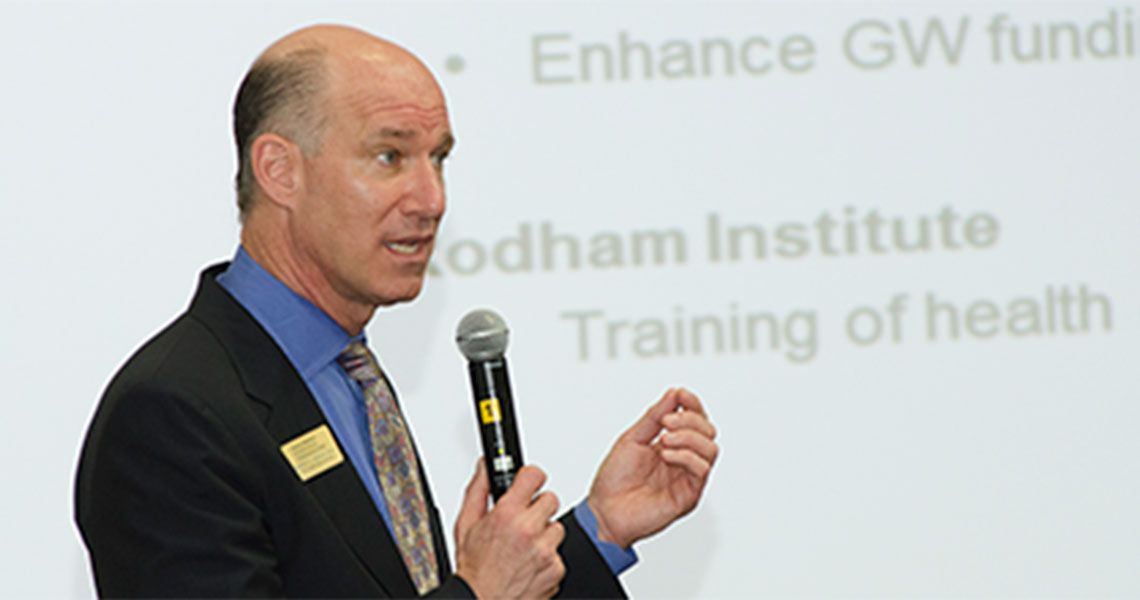Alumni filled the seats of Ross Hall’s largest classroom to hear Jeffrey S. Akman, M.D. ’81, RESD ’85, Bloedorn Chair of Administrative Medicine, vice president for health affairs, and dean of the George Washington University (GW) School of Medicine and Health Sciences (SMHS) deliver the annual State of the School address, Sept. 21. The alumni and family members representing the classes of 1963, 1968, 1973, 1983, 1988, 1993, and 2003 were eager to hear the details of the developments at SMHS, some of which they had already noticed taking place throughout the building.
Among his remarks, Akman addressed some of the programmatic changes in SMHS. He announced the establishment of two new offices within the school — the Office of Diversity, Inclusion, and Student Affairs, and the Office of Clinical Practice Innovation — and undated alumni on the school’s progress revising the medical program curriculum.
Nationally, academic accreditation requirements now include strong language regarding the investment and effort toward enhancing and maintaining diversity levels within medical school schools. To address those changing standards and maintain GW’s tradition of openness and inclusion, Akman established the Office of Diversity, Inclusion and Student Affairs, and named Yolanda Haywood, M.D., as associate dean responsible for overseeing the development, coordination, implementation and assessment of academic and research programs to promote diversity within SMHS.
“This is a priority of mine,” Akman told the audience. “Actually, our diversity numbers are great in terms of our students and our faculty. For the School of Medicine and Health Sciences, this is really about policies, procedures, and investment, and linking diversity to excellence.”
The new office will work to develop pipeline programs encouraging underrepresented minority students to pursue careers in the allied health professions, as well as supporting existing diversity and equity programs within SMHS.
The new Office of Clinical Practice Innovation will serve as the organizational home for developing and evaluating clinical interventions to improve medical care. Jesse Pines, M.D., M.B.A., professor of emergency medicine at SMHS, will lead the new initiative charged with increasing knowledge and understanding of structure, processes, and effects of health services for individuals and populations.
“This initiative will explore the intersection of medicine and public health, specifically, how do clinicians access and conduct data-driven research that in turn ties back into health care delivery,” explained Akman. “By leveraging our location and our existing partnerships with other, like-minded research institutions, we believe that we will make a positive difference for patients and health care providers.”
In the spring of 2012 SMHS began taking a closer look at the M.D. program curriculum to ensure that GW medical students received fundamental understanding of medical principles and clinical skills, as well as first-hand experiences with most advanced clinical practices. The ultimate goal is to establish a revised and enhanced M.D. program that is better suited to the challenges facing future generations of health care professionals.
“Our intent,” said Akman, “is to get students out of the lecture hall and into clinical spaces sooner. By integrating some of the pre-clinical, basic science training into the clerkships it will promote more opportunities for team-based learning with more time for reflection on what they’re, and offer students more contact with patients.”
Following Akman’s address, Associate Dean for Graduate Medical Education Nancy Gaba, M.D., provided alumni with an update on the school’s residency training programs. Following her remarks Benjamin Blatt, M.D., professor of medicine at SMHS, and Claudia Ranniger, M.D., Ph.D., assistant professor of emergency medicine at SMHS, detailed the progress on construction of 17,000 square feet of laboratory, clinical skills, and collaborative teaching space that will serve as the new SMHS Clinical Learning and Simulations Skills Center.
Annual Frank Miller Lecture
Nobel Laureate Ferid Murad, M.D., Ph.D., professor of Biochemistry and Molecular Biology at SMHS, presented the second annual Frank Miller Lecture. Murad discussed his landmark research on intracellular cellular messenger Nitric Oxide and its potential to answer three nagging questions: Can deadly tumors be treated with minimal side effects? How can stem cells be manipulated to grow into certain tissue types? Is there a cheap and portable way to save the millions of lives lost each year to diarrhea?
The annual Miller lecture honors one of the school’s most important and influential faculty members. The professor emeritus and former dean of students and curricular affairs and chair of department of pathology, was widely recognized as an influential teacher who shaped the future and careers of generations of GW medical students.



